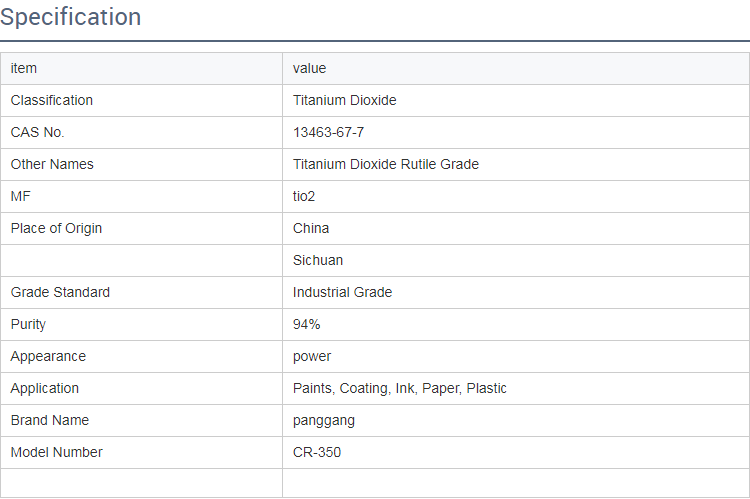
10 月 . 15, 2024 08:46 Back to list
Barium Sulphate Usage in Paint Manufacturing Processes and Its Environmental Impact
Barium Sulphate in Paint Factories An Overview
Barium sulphate (BaSO4) is a white crystalline compound that has garnered significant attention in various industrial applications, particularly in paint manufacturing. As a key ingredient in many paint formulations, barium sulphate offers unique properties that enhance the quality, durability, and performance of paints and coatings. This article delves into the role of barium sulphate in paint factories, its benefits, and the safety considerations associated with its use.
The Role of Barium Sulphate in Paints
Barium sulphate is primarily used as a pigment and filler in paint formulations. Its excellent opacity and whiteness make it an ideal choice for providing the necessary coverage in both architectural and industrial coatings. When incorporated into paints, barium sulphate improves the paint’s hiding power—meaning it can effectively cover underlying surfaces without requiring multiple coats. This is particularly advantageous in reducing labor costs and time during application.
Moreover, barium sulphate contributes to the overall viscosity of paint formulations. It helps achieve the desired thickness of paint, ensuring that it can be easily applied without running or dripping. This property is crucial in achieving smooth finishes, especially for high-quality decorative and automotive paints.
Benefits of Using Barium Sulphate
1. Chemical Stability One of the key advantages of barium sulphate is its chemical stability. It does not react with other components in paint formulations, ensuring that the paint maintains its consistency and performance over time.
2. UV Resistance Barium sulphate exhibits excellent resistance to ultraviolet (UV) radiation, which is vital in preventing color fading and degradation in outdoor applications. This quality extends the lifespan of paint, making it suitable for exterior surfaces exposed to sunlight.
3. Non-toxic Nature Compared to other white pigments like lead or cadmium-based compounds, barium sulphate is relatively non-toxic and poses less environmental risk. This characteristic aligns with the growing demand for eco-friendly and sustainable materials in the paint industry.
barium sulphate in paint factories

4. Cost-Effectiveness Barium sulphate is cost-effective as a pigment. Its abundance and low production cost make it a preferred choice for manufacturers looking to balance quality and affordability in their paint products.
Manufacturing Process in Paint Factories
In paint factories, barium sulphate is typically sourced from mineral deposits, where it is extracted and processed into a fine powder. The manufacturing process involves several steps, including crushing, milling, and surface modification to achieve the desired particle size and properties. This fine powder is then incorporated into paint formulations, blending seamlessly with other components such as resins, solvents, and additives.
Quality control is essential in this process to ensure that the barium sulphate used meets industry standards for purity and particle size distribution. Manufacturers often conduct rigorous testing to ensure that their paint products deliver superior performance and durability.
Safety Considerations
While barium sulphate is generally considered safe for use in paint products, it is still essential for manufacturers to adhere to safety guidelines and regulations. During the manufacturing process, appropriate protective measures must be taken to minimize dust exposure, which can be harmful if inhaled. Workers should be equipped with personal protective equipment (PPE) and trained on handling materials safely to prevent any incidents.
Additionally, regulatory bodies closely monitor the use of barium compounds in consumer products, including paints. Compliance with these regulations is crucial in ensuring that the final products are safe for consumers and the environment.
Conclusion
Barium sulphate plays a pivotal role in modern paint manufacturing, contributing to the quality, performance, and safety of paint products. Its properties, such as excellent opacity, UV resistance, and chemical stability, make it an invaluable ingredient in both decorative and protective coatings. As the paint industry continues to evolve, barium sulphate stands out as a reliable choice for manufacturers seeking to enhance their products while adhering to safety and environmental standards. Its benefits reinforce the importance of selecting high-quality materials in achieving superior paint performance for both industrial and residential applications.
-
Lithopone for Plastic & TiO2 R-5568/SK-6658 Masterbatch Solutions
NewsMay.30,2025
-
China Leading Rutile TiO2 Manufacturer - R5566 & R996 Grades Available
NewsMay.30,2025
-
High-Purity Anatase & Rutile TiO2 Powder Trusted Manufacturer
NewsMay.30,2025
-
High-Purity Anatase Products Trusted Supplier & Manufacturer
NewsMay.29,2025
-
Best Price Eco-Friendly Rutile TiO2 Supplier & Wholesale Factory
NewsMay.29,2025
-
Chinese Anatase Titanium Dioxide for Ceramic Glaze Reliable Supplier
NewsMay.29,2025
